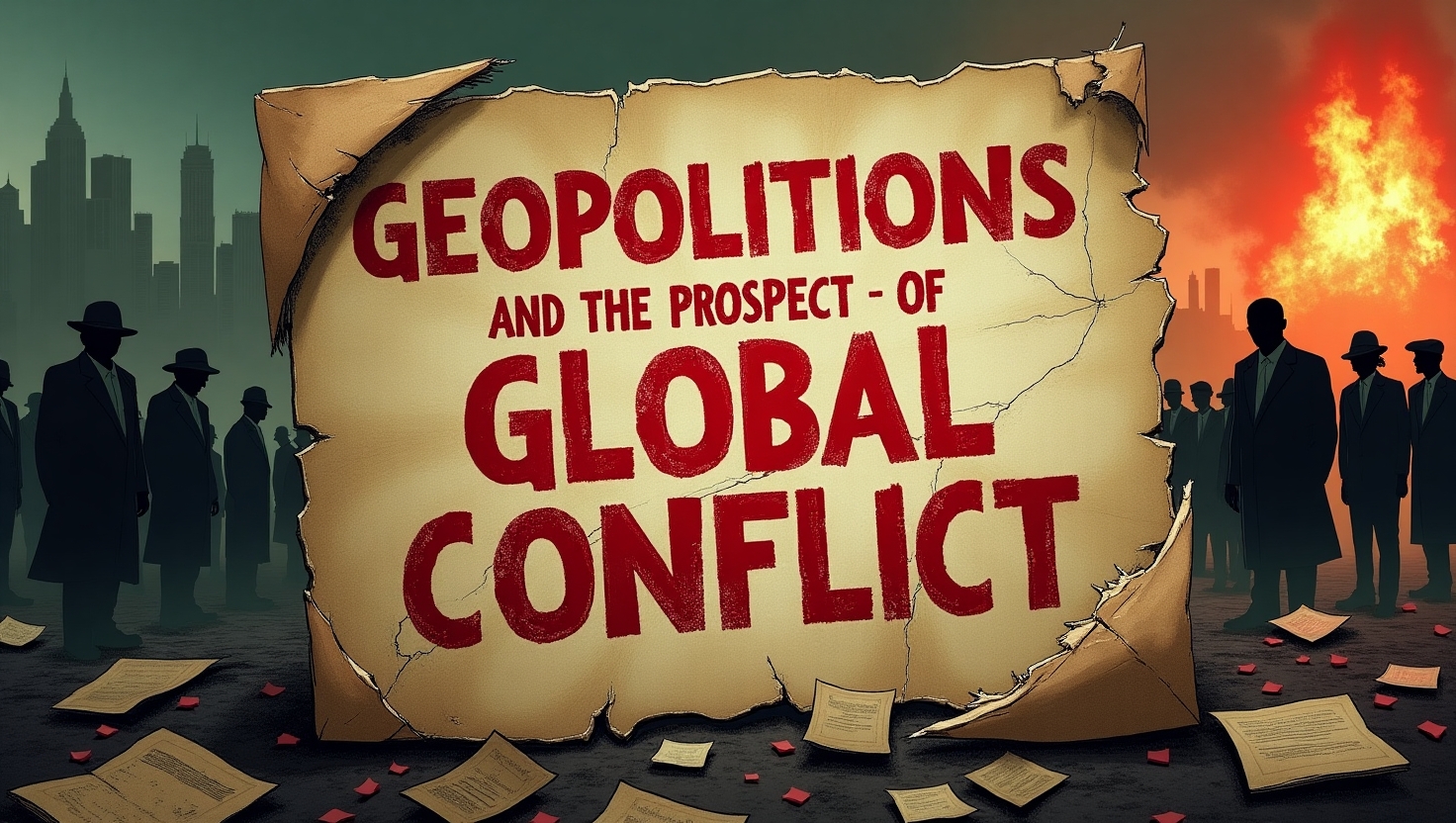
Introduction
Geopolitical Tensions The world today is navigating through a period of increasing uncertainty and volatility. As nations grapple with economic challenges, shifting power dynamics, and longstanding disputes, the current geopolitical tensions have become a focal point for policymakers, economists, and global observers. These geopolitical tensions are not merely regional conflicts; they have the potential to reshape global alliances and disrupt international stability. The urgency of understanding the factors that fuel these tensions and how they might escalate is crucial for predicting the future of global relations and taking immediate action to prevent potential conflicts.
In this article, we will delve into the nature of geopolitical tensions, explore the factors that contribute to these tensions, and examine the potential consequences of these dynamics. We will also analyze the current geopolitical tensions in April 2025 and provide insights on how geopolitics creates tension amongst nations.
Overview
Geopolitical tensions refer to the complex web of conflicts, rivalries, and competition between countries or regions that stem from a variety of economic, political, cultural, and strategic interests. These tensions can manifest in various forms, such as trade disputes, military standoffs, territorial claims, or ideological confrontations. The roots of these conflicts often lie deep in historical disputes, power struggles, and the pursuit of national interests.
The current geopolitical tensions in the world are not limited to a single region. They are distributed across multiple continents, from the East China Sea to the Middle East and the Arctic to Eastern Europe. What makes this period particularly concerning is the interconnectedness of these regions, where tensions in one area can have ripple effects globally. This interconnectedness underscores the global impact of these conflicts, making it crucial for all nations to be aware and prepared for potential consequences.
Detailed Section
The Causes of Geopolitical Tensions
Understanding the underlying causes of geopolitical tensions is not just a matter of academic interest. It’s a key to predicting and preventing potential conflicts that could have far-reaching implications for global stability. Several factors contribute to the rise in geopolitical tension:
- Economic Rivalries: As global powers compete for control of natural resources, markets, and strategic trade routes, economic interests often collide. Disputes over access to energy resources, particularly oil and natural gas, can fuel animosity between nations. The rise of China as a global economic superpower, for example, has led to heightened competition with the United States and other Western countries.
- Territorial Disputes: Territorial claims over land and sea are a significant source of geopolitical tensions. The South China Sea is a prime example, where several nations, including China, Vietnam, and the Philippines, claim sovereignty over key islands and waters. Similarly, the ongoing conflict over Crimea between Russia and Ukraine is rooted in territorial and national identity disputes.
- Ideological Differences: Ideological conflicts, particularly between democratic and authoritarian regimes, often give rise to geopolitical tensions. The ideological divide between Western democracies and nations such as China and Russia, which follow distinct political models, has been a longstanding source of friction in international relations.
- Military Posturing and Arms Race: The buildup of military forces and the proliferation of advanced weaponry contribute to geopolitical tension. The arms race between the United States, Russia, and China is a prime example of how military competition can escalate into heightened tensions. The development of nuclear weapons, cyber warfare capabilities, and advanced missile systems has made the stakes even higher.
- Nationalism and Identity Politics: Nationalism, often fueled by a desire to reclaim perceived lost territories or assert dominance over rival nations, can inflame geopolitical tensions. This trend has been evident in countries like Russia, where nationalist sentiment has played a role in its actions in Crimea and Ukraine. Similarly, in the Middle East, ethnic and religious identities continue to shape conflicts and alliances.
- Environmental and Climate Factors: Climate change and resource scarcity are increasingly seen as drivers of geopolitical tensions. As regions face droughts, floods, and other climate-related challenges, competition for resources like water and arable land intensifies. In some cases, these environmental pressures exacerbate pre-existing territorial disputes, creating new flashpoints for conflict.
Current Geopolitical Tensions: April 2025
As of April 2025, the world is witnessing a shift in geopolitical tensions that could have far-reaching implications. Current geopolitical tensions in several regions highlight the growing potential for conflict:
- Russia and Ukraine: The ongoing war in Ukraine continues to be a significant source of geopolitical tension. The Russian invasion of Ukraine, which began in 2022, has led to widespread suffering, a refugee crisis, and substantial economic sanctions on Russia. The conflict has also strained relations between Russia and NATO countries, further deepening the divide between East and West.
- United States and China: The U.S.-China rivalry remains a central theme in global geopolitics. Trade wars, military confrontations in the South China Sea, and differences over Taiwan have led to a heightened sense of competition. The escalating geopolitical tensions between the two superpowers in 2025 have reached a boiling point, with both sides engaging in military posturing and diplomatic standoffs.
- Middle East: The Middle East continues to be a hotbed of geopolitical tension, with multiple conflicts involving Iran, Saudi Arabia, Israel, and other regional actors. The rivalry between Iran and Saudi Arabia, coupled with the ongoing conflict in Yemen, has created a volatile situation that could easily spill over into a larger regional conflict.
- Africa: In Africa, rising political instability, particularly in countries like Sudan and Ethiopia, has contributed to an increase in geopolitical tensions. These tensions are exacerbated by competition for resources, ethnic conflicts, and the involvement of foreign powers seeking to exert influence over the continent’s economic and strategic assets.
How Geopolitics Creates Tension Among Nations
Geopolitics shapes the way countries interact with one another, and its influence is evident in the manner in which nations engage in diplomacy, trade, and military activity. The foundation of geopolitical tension lies in the competition for power, resources, and influence. When countries feel threatened or perceive a loss of power or resources, they may resort to aggressive policies, including military action, economic sanctions, or the formation of new alliances.
At its core, geopolitics creates tension amongst nations because each country has its own set of interests, whether related to national security, economic prosperity, or political influence. When these interests collide, the result is often heightened geopolitical tension as nations seek to assert their dominance, protect their sovereignty, or gain a strategic advantage over others.
Benefits of Addressing Geopolitical Tensions
While geopolitical tensions pose significant risks to global stability, there are potential benefits to addressing these issues before they escalate into full-scale conflict. By understanding the root causes of these tensions and working towards diplomatic solutions, we can pave the way for a more stable and peaceful global community, instilling hope for a brighter future.
- Diplomatic Solutions: By engaging in diplomacy and dialogue, nations can address disputes without resorting to violence. Multilateral organizations such as the United Nations (UN) and regional alliances like the European Union (EU) can play a crucial role in mediating conflicts and fostering cooperation.
- Economic Stability: Reducing geopolitical tension allows countries to focus on economic growth and cooperation, leading to a more stable global economy. By easing trade barriers and avoiding military conflicts, nations can enhance their financial well-being and contribute to global prosperity.
- Peace and Security: By addressing geopolitical tensions through peaceful means, the risk of global conflict is minimized. This ensures the safety and security of nations, as well as their citizens, who bear the brunt of war’s consequences.
- Humanitarian Benefits: Resolving conflicts can prevent humanitarian crises, including the displacement of millions of refugees and the loss of innocent lives. Working toward peaceful solutions can save countless lives and improve the living conditions of those affected by geopolitical instability.
FAQs Section
Q1: What are the leading causes of geopolitical tensions?
A1: Geopolitical tensions are primarily caused by economic rivalries, territorial disputes, ideological differences, military posturing, nationalism, and environmental factors.
Q2: How can countries de-escalate geopolitical tensions?
A2: Countries can de-escalate tensions by engaging in diplomacy, resolving territorial disputes, reducing military buildups, and fostering economic cooperation through multilateral organizations.
Q3: What are the potential consequences of escalating geopolitical tensions?
A3: Escalating tensions can lead to war, economic collapse, the breakdown of alliances, widespread human suffering, and the disruption of global trade.
Q4: How does the rise of China contribute to global geopolitical tensions?
A4: China’s economic growth, military expansion, and assertiveness in territorial disputes, particularly in the South China Sea, have contributed to increased geopolitical tensions with countries like the United States and its allies.
Final Thoughts
The world is witnessing an unprecedented rise in geopolitical tension, driven by a multitude of factors, including economic competition, territorial disputes, and ideological divides. While geopolitical tensions may seem distant, their consequences can significantly impact global trade, peace, and security. As we approach the current geopolitical tensions in April 2025, nations must seek diplomatic solutions and work collaboratively to prevent conflict. The future of global relations will depend on how well countries manage these tensions and strive to create a more stable and cooperative international order.



